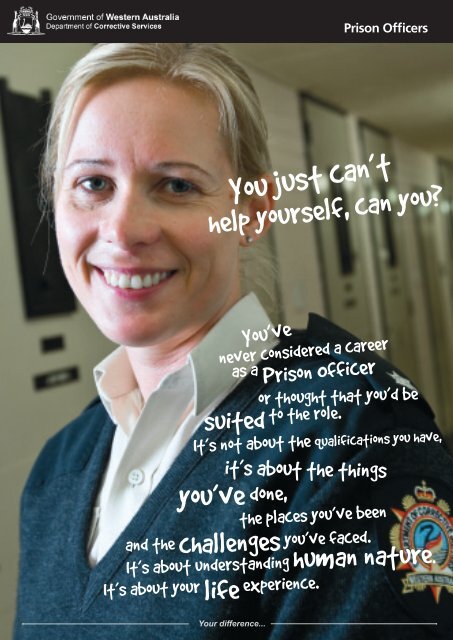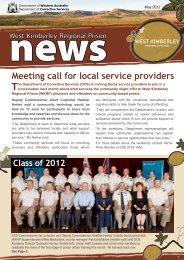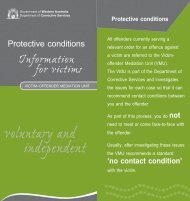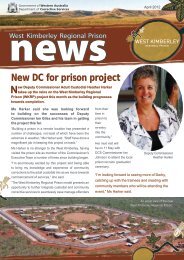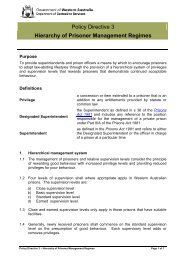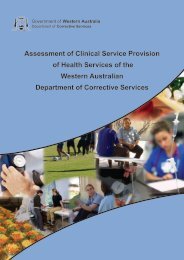Prison officers brochure - Department of Corrective Services
Prison officers brochure - Department of Corrective Services
Prison officers brochure - Department of Corrective Services
Create successful ePaper yourself
Turn your PDF publications into a flip-book with our unique Google optimized e-Paper software.
You just can’t<br />
help yourself, can you?<br />
You’ve<br />
never considered a career<br />
as a <strong>Prison</strong> Officer<br />
or thought that you’d be<br />
suited to the role.<br />
It’s not about the qualifications you have,<br />
it’s about the things<br />
you’ve done,<br />
the places you’ve been<br />
and the challenges you’ve faced.<br />
It’s about understanding human nature.<br />
It’s about your life experience.<br />
Your difference...<br />
<strong>Prison</strong> Officers
Why do it?<br />
There are many reasons you might choose a career as a <strong>Prison</strong><br />
Officer. But overriding any <strong>of</strong> these is your understanding<br />
<strong>of</strong> human nature and your genuine commitment to others.<br />
Knowing you’ve helped put structure into someone’s life is<br />
the biggest reward. And that’s just one part <strong>of</strong> it.<br />
At the <strong>Department</strong> <strong>of</strong> <strong>Corrective</strong> <strong>Services</strong> (DCS), we can give<br />
you plenty <strong>of</strong> great reasons to choose a career as a <strong>Prison</strong><br />
Officer. Here are just a few <strong>of</strong> them:<br />
• employment security<br />
• a rewarding career<br />
• flexible working conditions<br />
• generous leave entitlements<br />
• competitive salary<br />
• promotional and career development opportunities<br />
• paid training<br />
• salary packaging<br />
• uniform supplied (inc. shoes, socks, jackets and hats).<br />
Then <strong>of</strong> course there’s our flexible rostering system that<br />
provides a number <strong>of</strong> shifts including weekend, public<br />
holiday and night shifts. And for those who work at Eastern<br />
Goldfields (Kalgoorlie), Pardelup (Mt Barker), Albany,<br />
Greenough (Geraldton), Broome or Roebourne regional<br />
prisons, you can also look forward to additional financial<br />
incentives, including an annual regional allowance.<br />
The day to day<br />
You’re here to put structure into people’s lives, to give them<br />
purpose and meaning, which means you’ll be involved in<br />
every aspect <strong>of</strong> an <strong>of</strong>fender’s life. Your duties are likely to<br />
vary depending on the security level <strong>of</strong> the prison, but will<br />
usually include:<br />
• induction <strong>of</strong> <strong>of</strong>fenders<br />
• helping <strong>of</strong>fenders put a plan together that makes the<br />
best use <strong>of</strong> their time inside<br />
• staffing different units in the prison<br />
• helping with vocational training <strong>of</strong> <strong>of</strong>fenders<br />
• supervising recreation, industry and<br />
training activities<br />
• writing reports<br />
• working on reception.<br />
What you need to succeed<br />
It goes without saying that a real interest in people from<br />
all walks <strong>of</strong> life is top <strong>of</strong> the list. This is critical to your role.<br />
You need to be able to read a situation and handle it in the<br />
best way possible. Just as you need to be firm but fair and<br />
consistent and non-judgemental in the way you respond to<br />
people.<br />
You’ll need to be confident, influential and observant, alert<br />
at all times. Your ability to think clearly, act calmly and use<br />
your initiative will be put to good use. But it’s your wealth<br />
<strong>of</strong> life experience that will get you through each situation<br />
every day. On one hand you’ll be a leader and pr<strong>of</strong>essional,<br />
on the other someone who can support <strong>of</strong>fenders to make<br />
the right choices.<br />
But your biggest challenge will be building<br />
relationships with the <strong>of</strong>fenders in your care.<br />
It’s about knowing when to show them who’s<br />
in charge and when to show them you understand. It’s about<br />
putting structure into their lives.
Selecting the best<br />
Maybe it’s something<br />
Before you’re considered for assessment as<br />
a <strong>Prison</strong> Officer, you’ll need to have Australian<br />
citizenship or permanent residency status, or New<br />
Zealand citizenship.<br />
It’s also important that you have an unrestricted<br />
C-class (manual) driver’s licence and a Senior or<br />
Advanced First Aid Certificate that includes CPR.<br />
Aside from all that, you should also be prepared to<br />
obtain an HR-class driver’s licence within 12 months<br />
<strong>of</strong> completing your training. The <strong>Department</strong> will pay<br />
for this and you’ll be able to obtain the licence during<br />
working time.<br />
You’ll also be expected to undergo criminal history<br />
screening and integrity checking for any convictions<br />
or associations you might have that could compromise<br />
your role. It’s important to note that certain <strong>of</strong>fences<br />
or associations will automatically disqualify your<br />
application, however the existence <strong>of</strong> a criminal<br />
history does not mean you will automatically be<br />
assessed as unsuitable. Each case is assessed on its<br />
merits.<br />
you’ve experienced,<br />
or it’s the way you are with people.<br />
Maybe you’re a natural<br />
when it comes to reading situations.<br />
Regardless,<br />
you can’t help but<br />
want to make their<br />
lives better.<br />
Our recruitment process has been specifically designed to ensure it’s fair and in line with<br />
Public Sector Standards in recruitment. Our selection processes are very thorough and you’ll<br />
need to pass each stage <strong>of</strong> your assessment in order to become a <strong>Prison</strong> Officer.<br />
What you’ll need<br />
It’s all part <strong>of</strong> the process<br />
As part <strong>of</strong> your assessment and training period,<br />
you’ll be expected to complete the following:<br />
• eligibility and identification checks<br />
• employment pr<strong>of</strong>ile assessment<br />
• selection panel interview<br />
• medical assessment<br />
• fitness assessment<br />
• criminal history screening<br />
• integrity checking.<br />
Your difference...<br />
Once you get through the selection stage, you’ll be<br />
placed in our <strong>Prison</strong> Officer Appointment Pool from<br />
which you will be considered for employment as<br />
positions become available.<br />
If you’re <strong>of</strong>fered a position, you’ll take up a role as<br />
a Probationary <strong>Prison</strong> Officer. Your career will begin<br />
with 12 weeks paid training. This is part <strong>of</strong> a ninemonth<br />
entry level training program where you’ll need<br />
to satisfy specific entry, training and performance re<br />
quirements.
Entry Level Training Program<br />
The 12-week training course is followed by a six-month onthe-job<br />
probationary period. The course covers everything<br />
needed to get you started, including communication<br />
and written skills, knowledge <strong>of</strong> the judicial and welfare<br />
systems, cross cultural training, addiction studies,<br />
<strong>of</strong>fender management, prisoner programs, security<br />
and emergency procedures, communicable diseases<br />
and responding to medical emergencies.<br />
During the six-month probationary period, you’ll need to show<br />
you’re competent in specific skills and work environments<br />
through ongoing formal and informal assessments and<br />
performance feedback. You’ll also need to put together a<br />
portfolio <strong>of</strong> your work to showcase your competency during<br />
this phase.<br />
Once you’ve successfully completed your training and<br />
assessment, you’ll be awarded a Certificate III in Correctional<br />
Practice.<br />
Do you think you have<br />
what it takes?<br />
Assess yourself honestly against the following skills and abilities.<br />
If you tick every box, we believe you’ve got what it takes. The<br />
question is, do you?<br />
� Leadership qualities and the ability to accept<br />
responsibility<br />
� Dependable and reliable<br />
� Excellent people and relationship building skills<br />
� Enjoy working as part <strong>of</strong> a team<br />
� Genuinely interested in people<br />
� Willing to give your time and energy to help<br />
� Relate to and respect people from different ethnic and<br />
cultural backgrounds<br />
� Fair and consistent<br />
� Non-judgemental<br />
� Strong communication skills<br />
� Follow instructions and follow rules<br />
and regulations<br />
� Basic computer skills<br />
� Can demonstrate honesty, integrity<br />
and pr<strong>of</strong>essionalism<br />
� Physically fit<br />
� Flexible to work shifts, including nights, weekends and<br />
public holidays.
This is by far one <strong>of</strong> the most<br />
challenging, rewarding and varied<br />
careers you’ll encounter,<br />
not least because <strong>of</strong> the people<br />
and situations you’ll face,<br />
but because <strong>of</strong> the<br />
difference<br />
you can make to the lives<br />
Your difference..<br />
<strong>of</strong> <strong>of</strong>fenders,<br />
their families and<br />
the community.<br />
It’s this and the<br />
satisfaction<br />
you get from it,<br />
that’s hard to beat.
<strong>Prison</strong> locations<br />
A bit about us<br />
DCS is one <strong>of</strong> the state’s largest government<br />
employers with almost 4,000 staff. It’s our<br />
responsibility to take care <strong>of</strong> all adult and juvenile<br />
<strong>of</strong>fenders in custody and in the community across<br />
WA. And it’s our job to see that court orders are<br />
followed and community standards upheld. We<br />
also act as mediators when helping victims <strong>of</strong> crime.<br />
We’ll be the first to admit it’s not an easy job, but<br />
it’s without doubt one <strong>of</strong> the most rewarding.<br />
Our Adult Custodial division is responsible for<br />
13 prisons and six work camps. Everyone<br />
works toward breaking the cycle <strong>of</strong> people<br />
re-<strong>of</strong>fending, protecting the community and<br />
helping <strong>of</strong>fenders adopt law-abiding lifestyles.<br />
We aim to acheive this through promoting<br />
emotional and physical wellbeing, engaging<br />
<strong>of</strong>fenders in programs, providing education<br />
and activities that are used to put structure into<br />
their lives to help them make the right choices.<br />
Your difference..<br />
Contact us<br />
For more information on careers at DCS, visit<br />
www.correctiveservices.wa.gov.au or email DCS<br />
Recruiting on dcs.recruiting@correctiveservices.<br />
wa.gov.au. Alternatively, call (08) 9264 9615.<br />
Updated November 2010<br />
© <strong>Department</strong> <strong>of</strong> <strong>Corrective</strong> <strong>Services</strong> 2008-2010


